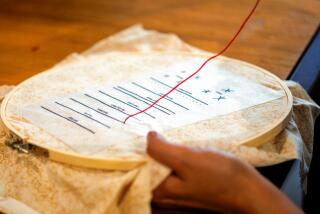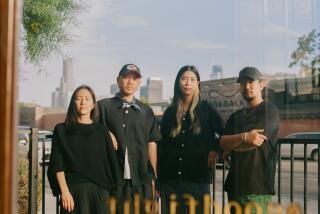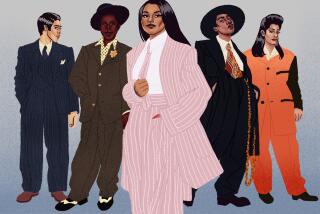Made in U.S.A. Label Is No Guarantee : Shoppers must urge retailers to ensure that their suppliers treat workers humanely.
- Share via
Eighty-five years ago, a fire broke out in the top stories of a building off Washington Square in New York City. Eight hundred fifty people, mainly young women, were working on the eighth, ninth and 10th floors, making blouses, called shirtwaists, behind locked doors (to keep them from taking breaks) for no more than $6 a week. The fire engine ladders of the time reached only six stories up. There was one fire escape. In the 10 minutes it took to put out the fire, 146 women and men of the Triangle Shirtwaist Co. were either burned to death or, according to a New York Times reporter in a flight of poetic hyperbole, had their bodies “broken into a thousand pieces” on the sidewalks below.
The other day outside the building, a rally commemorated the Triangle Shirtwaist fire. The fire department sent three engines for the ceremony, as it does every year. The ladder of one ascended slowly like a mechanical angel, two stories short of salvation. The fire commissioner, Howard Safir, noted that the Triangle fire was the spur for tough fire codes. It also stimulated state laws and city codes that regulated working conditions, safety and hours into some semblance of decency.
The building now houses New York University classrooms, but the ralliers were not, in the main, students, few of whom know what happened there. The ralliers were today’s sweatshop workers, mainly immigrants who are thrown on the mercy of the city’s largest manufacturing sector. Their placards and speeches were in Chinese and Spanish as well as English, not the Yiddish and Italian that were the tongues of the workers of 1911. At the moment, they have even more trouble organizing unions than their predecessors. Thus does the 20th century rumble toward an end that eerily recapitulates its beginning.
In the spirit of this time, some of today’s business proprietors share the longing for an older, simpler America where jackbooted investigators from Big Government did not pound upon the doors of freedom-loving enterprises asking unpleasant questions about compliance with the law. In the city, New York state’s apparel task force inspects 1,300 shops a year with its 20 inspectors. Close to half have both labor and safety violations and thus can be considered sweatshops. Roughly one-third have blocked aisles or bolted doors.
As in Los Angeles today and New York in 1911, the sweatshops thrive on workers who gravitate to workplaces where they can speak the language. These Asians and Latinos frequently don’t know what wage they are being paid because they are paid in cash, off the books, at the end of the week or after several weeks or not at all, because the contractor goes belly-up, which happens at least once a month. Many work in spurts, more than 12 hours a day, including holidays, and about 60% of the shops pay no overtime. Many of these workers don’t know that there is a legal minimum wage of $4.25 per hour and are paid less in any case. Note that if two adults in a household earn the minimum wage, the total still leaves them on the wrong side of the poverty line.
The rally of a few hundred, neither immense nor embarrassing, was organized by the Union of Needletrades, Industrial and Textile Employees, which is calling on consumers to ask retailers about suppliers’ labor conditions just the way they would ask about colors and sizes. Disagreeable as this may sound, a bargain for the buyer should sound a warning gong. Incredibly cheap may well mean exploitatively cheap. Consumers get the working conditions they pay for. A “Made in U.S.A.” label may look snazzy on a Pat Buchanan bumper sticker but says nothing about whether American-made clothes come from sweatshops. If store managers don’t know where the clothes come from, they can always find out. But, of course, even retailers that pledge to make their suppliers attest to reasonable conditions may not enforce their pledge.
The Triangle rally over, the workers walked past the silent fire engines down into Soho, passing out shopping bags designed by artist Barbara Kruger that say: “These clothes were not made by exploited women and children in nonunion sweatshops.” A lot of these folks had trouble explaining themselves to Sunday shoppers--they don’t speak English. They could use some help making it into the 21st century in one piece.
More to Read
Sign up for Essential California
The most important California stories and recommendations in your inbox every morning.
You may occasionally receive promotional content from the Los Angeles Times.












